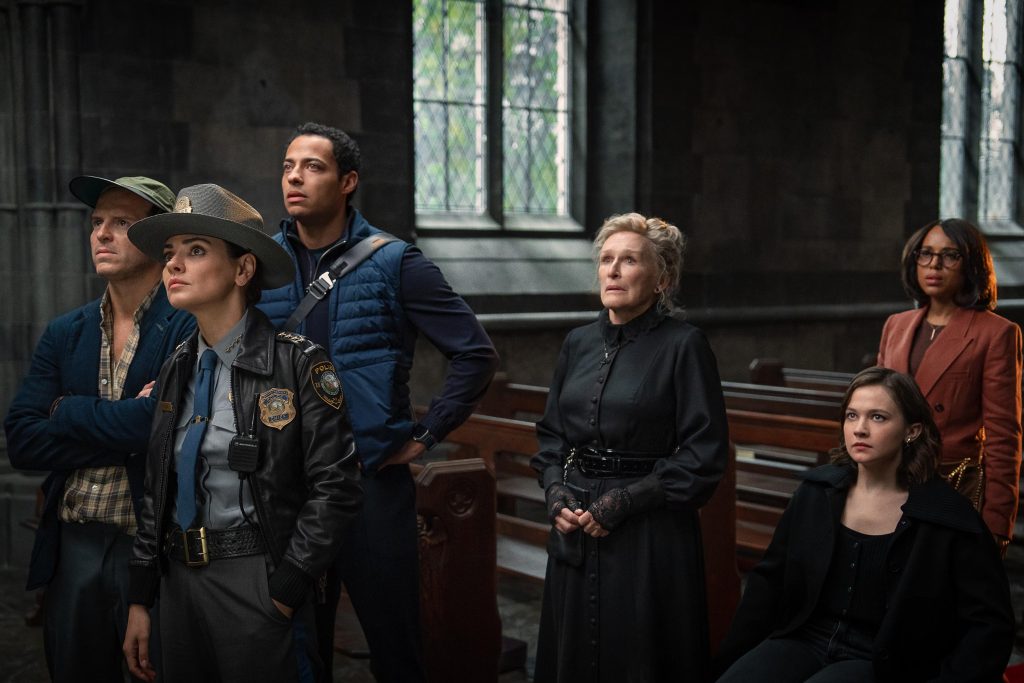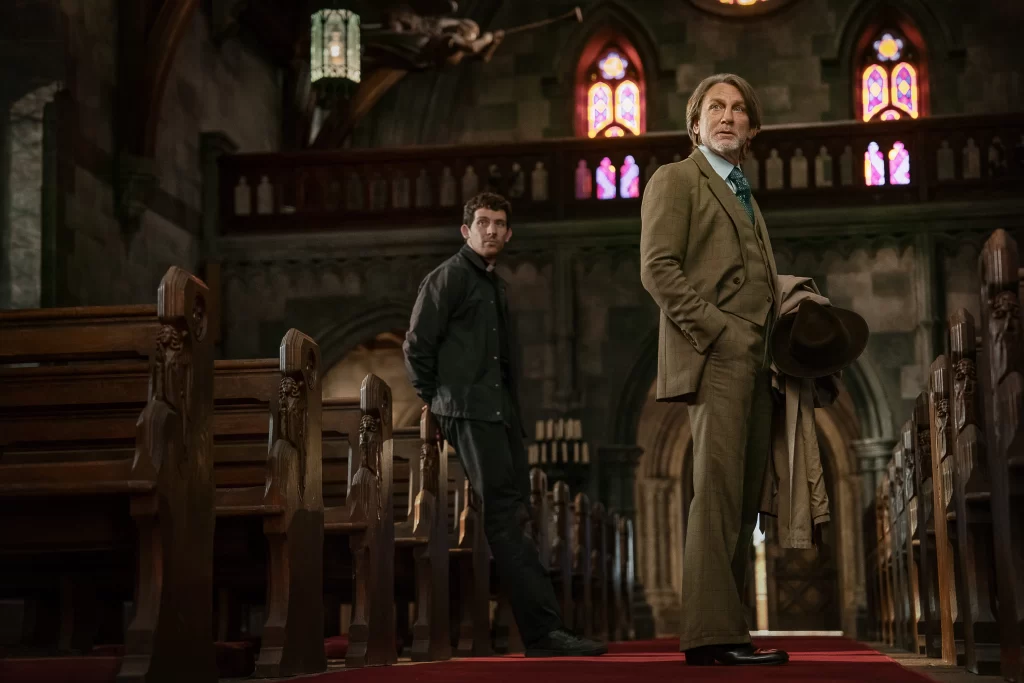The most admirable quality of Wake Up Dead Man, Rian Johnson’s latest Knives Out sequel, is how adroitly he manages to both deliver what audiences are expecting while taking real risks in the process of that delivery. This new yarn belongs to a different subset of the murder mystery, the supernatural-tinged Gothic stories of Poe or Wallace, but set within a church and its small community of parishioners. “The Good Friday murder,” it’s called early on, but Benoit Blanc (Daniel Craig) won’t shroud it in euphemisms. “This was dressed as a miracle. But it is a murder. And I solve murders.”
By this point in the series, the formula is well-established; there is a “perfectly impossible crime,” so the Columbo-esque Blanc comes in, sizes things up, investigates the details and questions the clues, and then gathers the outsized cast of characters for his Poirot-style rundown of whodunit. A less appreciated but equally important piece of his puzzle is the Innocent Ingenue, a figure of sympathy who looks, at least briefly, like the most likely suspect: Ana de Armis in Knives Out, Janelle Monae in Glass Onion, and, in this installment, Josh O’Connor as Rev. Jud Duplenticy, a streetwise priest and onetime boxer who is, by his description, “Young, dumb, and full of Christ.”
As punishment for an altercation with a dislikable deacon, Jud is sent to the small New York village of Chimney Rock, where Monsignor Jefferson Wicks (Josh Brolin) runs the Our Lady of Perpetual Fortitude church with an iron fist. “His flock is shrinking, and even calcifying,” Jud is told, and Wicks harbors no illusions as to why this upstart is there, greeting Jud with a pointed “Welcome to my church.” He’s a piece of work, delivering fierce homilies of fire and brimstone (“Anger lets us fight back, take back the ground we’ve lost”), closing ranks around him so that only his loyalest followers bother to sit in the pews on Sundays. Jud sees what he’s doing, and tries to call him on it, promising to “do whatever it takes to stop you,” a threat that sounds like a motive when Wicks drops dead during the Good Friday service.
Blanc makes an even later entrance than usual, a good 30 minutes in, following a complex setup that methodically introduces the sprawling cast of characters – not only who they are, but how they’re broken. Even without our franchise regular, the opening section is never less than involving, thanks to the trust Johnson has earned in these previous installments. We put ourselves in his hands, and those of his tip-top cast; all are good, but Glenn Close may be the MVP, holding our attention in long, key scenes where she has essentially perform exposition dumps, as both the actor and the character hide true motivations and half-truths inside rhetorical flourishes.

Some of the humor in these early scenes is on the cheap side (lots of priests swearing and talking about masturbation), and Blanc gets his laughs, and stakes his claim, right away by describing himself as a “proud heretic.” This makes him a fine counterweight to O’Connor, the magnetic co-star of Challengers and The Mastermind, who may have the most to prove here, and does so; this guy’s got the movie-star goods, but you’ll never catch him showing off. He finds the character’s inner metronome, the sense of righteousness that powers him through even his moments of anger and weakness. And because he establishes those fine qualities, Johnson is able to navigate a turn in the material, acknowledging and even admiring acts of genuine faith and goodness, with a nimbleness that’s kind of awe-inspiring.
As the body count increases, the murders get stranger and more ornate; there are jump scares and dramatic thunderstorms and red herrings, not just in terms of plotting, but in the structure of such an oft-told tale. As both a writer and director, Johnson is simply very good at this, at crafting these seemingly impossible crimes, and building airtight mysteries around them; all are witty, giddy, and unapologetically brainy, while retaining their crowd-pleasing qualities.
Some cringed at the explicitly online-political pieces of Knives Out, and they’ll feel the same about some of this material, but to tell a story about modern religion without getting political would be wildly dishonest. But he also doesn’t sneer at the faith of his characters; Blanc may be a proud heretic, but I don’t think Johnson is, and that matters. Wake Up Dead Man does everything you want the third Knives Out movie to do — and then it goes deeper, which is some neat trick.
A-
“Wake Up Dead Man” is in select theaters Wednesday and streams December 12 on Netflix.

